
In 1942, the United States War Department distributed a handbook to American servicemen that advised them on the peculiarities of the "British, their country, and their ways." Over sixty years later, this newly published reproduction from the rich archives of the Bodleian Library offers a fascinating glimpse into American military preparations for World War II. 
An indispensable cooking reference including every issue of Cook's Illustrated from 1993 in an all-inclusive, hardcover volume. 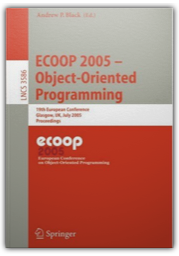
This book constitutes the refereed proceedings of the 19th European Conference on Object-Oriented Programming, ECOOP 2005, held in Glasgow, UK, in July 2005. 
Users have become an integral part of technology studies. The essays in this volume look at the creative capacity of users to shape technology in all phases, from design to implementation. Using a variety of theoretical approaches, including a feminist focus on users and use (in place of the traditional emphasis on men and machines), concepts from semiotics, and the cultural studies view of consumption as a cultural activity, these essays examine what users do with technology and, in turn, what technology does to users. The contributors consider how users consume, modify, domesticate, design, reconfigure, and resist technological development—and how users are defined and transformed by technology. 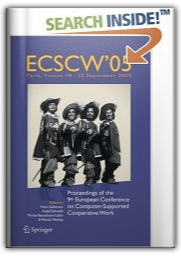
The emergence and widespread use personal computers and network technologies have seen the development of interest in the use of computers to support cooperative work. This volume presents the proceedings of the ninth European conference on Computer Supported Cooperative Work (CSCW). This is a multidisciplinary area that embraces the development of new technologies grounded in actual cooperative practices. These proceedings contain a collection of papers that reflect the variegated research activities in the field. The volume includes papers addressing novel interaction technologies for CSCW systems, new models and architectures for groupware systems, studies of communication and coordination among mobile actors, studies of cooperative work in complex settings, studies of groupware systems in actual use in real-world settings, and theories and techniques to support the development of cooperative applications. The papers present emerging technologies alongside new methods and approaches to the development of this important class of applications. The work in this volume represents the best of the current research and practice within CSCW. The collection of papers presented here will appeal to researchers and practitioners alike, as they combine an understanding of the nature of work with the possibility offered by new technologies. 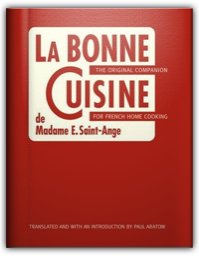
First published in 1927 to educate French housewives in the art of classical cooking, LA BONNE CUISINE DE MADAME E. SAINT-ANGE has since become the bible of French cooking technique, found on every kitchen shelf in France. A housewife and a professional chef, Madame Evelyn Saint-Ange wrote in a rigorous yet highly instructive and engaging style, explaining in extraordinary detail the proper way to skim a sauce, stuff a chicken, and construct a pâté en croûte.Though her text has never before been translated into English,Madame Saint-Ange's legacy has lived on through the cooking of internationally renowned chefs like Julia Child and Madeleine Kamman, setting the standard for practical home cooking as well as haute cuisine. In this momentous translation by Chez Panisse cofounder and original chef de cuisine Paul Aratow, Madame Saint-Ange's culinary wisdom is available in English for the first time.Enveloped in charming intricacies of even the most fundamental cooking techniques are 1,300 authentic French recipes for such classics as Braised Beef, Quiche Lorraine, Cassoulet, and Apricot Soufflé; original illustrations of prepping and cooking techniques; and seasonal menus for every meal of the day. An indispensable culinary encyclopedia and an absorbing historical document, LA BONNE CUISINE DE MADAME E. SAINT-ANGE is the definitive word on French cooking for food lovers, dedicated cooks, culinary professionals, and Francophiles alike.Reviews:“[A] book that I adore and that was my mentor in my early days in France. . . . It was a carefully thought-out, very personal book, and one had complete confidence in what she had to say. . . . I still love it.”âJulia Child (Simple Cooking, “Reminisces,” 1989) “It would be difficult to overestimate the service rendered to monolingual English and American cooks by the translation of this massive, instructive, and, in its way, very funny book.”âGourmet “This warhorse of French cookery . . . is a proudly hidebound volume on the (Thoroughly French) Right Way to Cook. . . . The book reads like The Joy of Cooking for the dominatrix set. Still, it's hard not to love a writer with such dramatic flair.”âBon Appetit “If you want to add one new definitive cookbook to your larder, we suggest the English edition of LA BONNE CUISINE. . . . This is the tome that got Julia Child cooking as a postwar bride in Paris.”âLos Angeles Magazine “[T]his magisterial translation offers a window into a bygone moment in French life and is a testament to the enduring joy of cooking with cookbooks.”âPublishers Weekly Starred Review “The gift for the serious cookbook lover who has everything. . . . [T]he go-to manual of the French home kitchen.”âSan Francisco Chronicle “[A] tidy how-to treatise on traditional (and ambitious) home cooking by a working mother in Paris in the first half of the 20th century.”âNew York Times Magazine “[A] fascinating work, at once an encyclopedia of the basic techniques o cooking and a snapshot of French cuisine as it existed in the early 20th century.”âLos Angeles Times “[A]n important book for both food lovers and cooks, with fine explanations of exactly how to prepare the classic French dishes we Americans already love (and a few not yet discovered).”âTraditional Home “A lasting feast for your foodie friends.”âBudget Living “One of the most detailed, interesting, well-written, and technically proficient books for the French home cook. . . . I learned one hundred times more from it than I did from Escoffier and other great chefs.”âMadeleine Kamman“Julia Child . . . had been much influenced by Mme. Saint-Ange, who in the 1920s wrote step-by-step instructions that guided French women through the intricacies, and also the simplicities, of cuisine bourgeoise.”âCorby Kummer, The Atlantic “Finally, this great book has been translated. My French edition has lost its cover from thirty years of almost constant use. LA BONNE CUISINE DE MADAME E. SAINT-ANGE is filled with good sense, logic, and boundless information about the world's best home cooking, and it is deeply grounded in the traditions and techniques that define a great cuisine. It's not just a book of recipes, but helps us master a subtle and immensely satisfying art.”âJames Peterson, author of Sauces“LA BONNE CUISINE DE MADAME E. SAINT-ANGE is the first French blockbuster written by a woman cook, and it remains my favorite. Saint-Ange has a turn of phrase and a depth of culinary knowledge that have rarely been equaled. At first glance her book appears inordinately long, but she carries us without faltering. Some recipes may take a couple pages of dense print to explain, but at the end you know you will emerge triumphant, with perfection on the plate.”âAnne Willan, founder of Ãcole de Cuisine La Varenne“Among its many treasures, this marvelous book offers as clear a picture as we can ever hope to get of the workings of the French home kitchen at a time when the meals that came from it were justly the pride of France. The supernaturally knowledgeable Madame Saint- Ange was to her country what Fannie Farmer was to America, but she had the better tools and the better cuisine to work with, and she possessed a forthright Gallic charm entirely her own. For decades, the absence of this book in English translation has been a culinary embarrassment. Paul Aratow has now decisively changed all that, for which he has my endless thanks.”âJohn Thorne, author of Simple Cooking and Pot on the Fire“With his masterful translation of LA BONNE CUISINE DE MADAME E. SAINT-ANGE, Paul Aratow has done a great service to lovers of food, food lorists, and curious cooks everywhere. It's a Joy of Cooking and a Mastering the Art of French Cooking stitched together with dishes from the French family homeâall wrapped into one comprehensive volume that will entice and intrigue anyone interested in one of the major foundations of our new American cooking.”âVictoria Wise, former chef of Chez Panisse“The classic cooking of Madame Saint-Angeâso fresh and so Frenchâlives on as testament to a true passion for bonne cuisine and a wonderful lesson in echnique.”âDaniel Boulud, chef of Daniel“This book will fascinate students of French gastronomy and those with a particular interest in the mores of middle-class French households in the early part of the twentieth century. As a window into French cookery, it is an extraordinary work.When read alongside Escoffier, whilst the scope is very similar, Madame Saint-Ange includes far more explanatory information, and although the tone is formal, it is also meticulous and often illuminating.”âStephanie Alexander, author of The Cook's Companion“Styles of cuisine may change, but the fundamentals are forever. There is more commonsense basic cooking instruction in this book than in most libraries.”âRuss Parsons, Los Angeles Times food columnist and author of How to Read a French Fry |
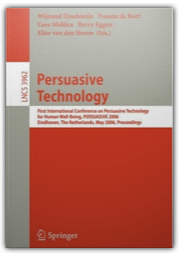
This book constitutes the refereed proceedings of the First International Conference on Persuasive Technology for human well-being, PERSUASIVE 2006, held in Eindhoven, The Netherlands, in May 2006. 
This book constitutes the refereed proceedings of the 8th International Conference on Ubiquitous Computing, UbiComp 2006, held in Orange County, CA, USA in September 2006. The 30 revised full papers presented were carefully reviewed and selected from 232 submissions. The papers address all current issues in the area of ubiquitous, pervasive and handheld computing systems and their applications including topics like: improving natural interaction (applied sensing, fusion and reasoning, AI and speech technologies for Ubicomp, increasing machine understanding of human action and vice versa), constructing ubicomp systems (systems and toolkit support for constructing, maintaining and deploying and prototyping ubicomp environments), embedding computation (novel user interfaces, computational and sensing, actuator platforms, assistive technolgies, applied to ubicomp), understanding ubicomp and its consequences (conceptual models, lessons learnt, user studies and results from ubicomp experiments), deploying ubicomp technologies (privacy, security, and trust, real-world and deployment experiences, studies of ubicomp settings). 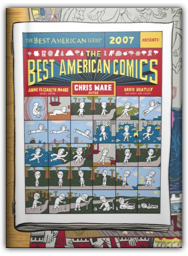
Guest editor Chris Ware and series editor Anne Elizabeth Moore have sought out the best stories to create this cutting-edge collection. Contributors include Lynda Barry, R. and Aline Crumb, Kim Deitch, Gilbert Hernandez, Seth, and Art Spiegelman. 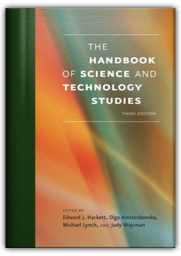
Science and Technology Studies is a flourishing interdisciplinary field that examines the creation, development, and consequences of science and technology in their cultural, historical, and social contexts. The Handbook of Science and Technology Studiesprovides a comprehensive and authoritative overview of the field, reviewing current research and major theoretical and methodological approaches and analyzing emergent issues in a form that is accessible to new and established scholars from a range of disciplines. Handbook chapters review the dominant theoretical perspectives of S&TS, present the current state of research on a spectrum of topics in the field, analyze changes brought about by the commercialization of science, study interactions between science and other institutions, examine the role of experts and the public in scientific and technological decision making, and consider the cultural and social dimensions of new technologies. 
More than one hundred glorious images, many of objects dating from the time of the story, enhance Seamus Heaney's masterful best-selling translation. 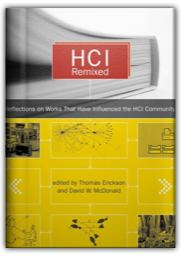
Over almost three decades, the field of human-computer interaction (HCI) has produced a rich and varied literature. Although the focus of attention today is naturally on new work, older contributions that played a role in shaping the trajectory and character of the field have much to tell us. The contributors to HCI Remixedwere asked to reflect on a single work at least ten years old that influenced their approach to HCI. The result is this collection of fifty-one short, engaging, and idiosyncratic essays, reflections on a range of works in a variety of forms that chart the emergence of a new field. 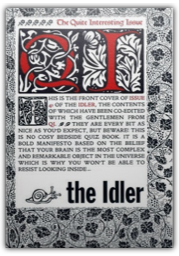
The Idler, the periodical of easy living, looks at protest movements and asks: Is there any point in taking to the streets? Would a more effective form of revolt be to lie in bed doing nothing? Look at John and Yoko — they made their point. |

My Library
Collection Total:
1165 Items
1165 Items
Last Updated:
Sep 9, 2009
Sep 9, 2009


 Made with Delicious Library
Made with Delicious Library